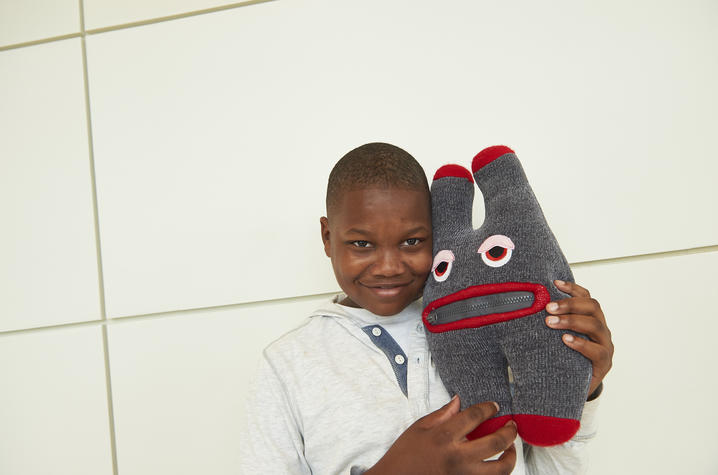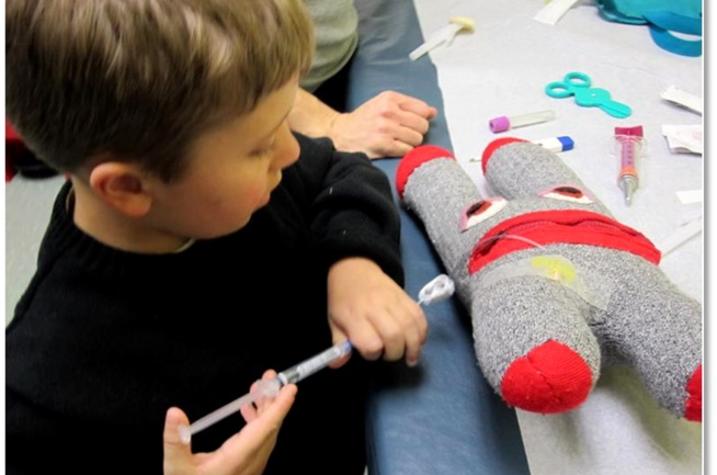The Cellie Coping Kit Helps Sick Kids Manage the Stress of Treatment
LEXINGTON, Ky. (Dec. 4, 2017) – Treatment for any serious medical condition can be daunting for even the most intrepid adults. But for children who deal with serious illness, the lack of understanding about what is happening to them coupled with fear and anxiety, can make it difficult for them to cope with their treatment. Dr. Meghan Marsac, pediatric psychologist and assistant professor in the UK College of Medicine, saw how many parents and children struggled to navigate the stress and logistics of treatment.
"When I was helping kids and parents adjust to what life was like with pediatric cancer, there were a lot of things we were teaching over and over again," said Marsac. "Parents wouldn't know these things. You're not supposed to have a kid with cancer."
And so Cellie was born. Designed by Marsac during her fellowship at Children's Hospital of Philadelphia, the Cellie Coping Kit was developed for children ages 6-12, and includes of a plush toy named Cellie, a deck of cards with coping and communication techniques, and a book for caregivers. The first Cellie kit was geared toward children with cancer, but has since been adapted for children with sickle cell disease, traumatic injuries, and food allergies. A kit for eosinophilic esophagitis, an allergy condition that causes inflammation of the esophagus, is in the works, as is a kit for the siblings of children with illness or disability.
The kit is designed not only to comfort children during their illness, but also to provide them with the tools they need to understand their treatment and communicate their feelings. The coping cards address various "stressors" children can face, from procedures (e.g. needle sticks), to emotional stress (anxiety and sadness), to side effects of treatment (nausea, hair loss). The kit also addresses how to manage situations such as missed school or playing outside. The caregiver book parallels the cards, giving parents the advice on how to address their child's concerns.
One card, for example, addresses a fear of needle sticks. The card in the child's kit lists several tips, such as "squeezing Cellie tight and looking at Cellie until it is over" or "tell your nurse or parent a story". The parent and child will discuss which suggestion to try.
"I think if she was having a specific problem, like sleep difficulties, I'd say, okay, let's pull out the 'I can't sleep' card and see if there are any ideas," said one parent.
"We reviewed the cards and that helped him understand that some of the feelings he has are similar to other children here," said one parent. "So he didn't feel like he was alone."
"The pain tips help me," said one child. "The pain thermometer, the faces, and the belly breathing card…that helped me a lot."
Much of Marsac's research is centered around developing and evaluating programs designed to help parents and children manage medical conditions and preventing long-term emotional impairment after illness or injury. Cellie was initially developed to help her own pediatric cancer patients, but Marsac recognized the need for coping tools for children with a variety of conditions. The Cellie Coping Kit for Sickle Cell Disease shares many components with the cancer kit. The food allergy kit was designed after Marsac's conversation with one of her students about the dearth of allergy resources for children.
Marsac and her team worked directly with doctors, nurses, psychologists, child life specialists and families to develop the kit. Extensive research was conducted to determine what was most difficult for families when it came to navigating treatment and what medical teams could do to assist families. Families reported that the kit was a useful tool in promoting conversations about illness in the family. Children who learn early how to discuss their illness are better equipped to manage it better as adults. One card advises children on how to talk to their friends and classmates about their condition. One parent noted that before they received the kit, "there were a lot of things we probably wouldn't talk about."
"She's just become more aware about [her condition] by reading the cards and asking a lot of questions," said one parent. "Some of the things on the cards she didn't understand before, so she has more of an education now."
"Most everything in the Cellie kit is the same as the things that are happening…I thought it only happened to my child that she's scared and nervous about her treatment," said one parent. "This is all the stuff we've been going through."
"We know that physical and emotional health are intertwined," said Marsac. "Our team's goal is to support both parts of health, and the kits are designed to walk families through treatment."







